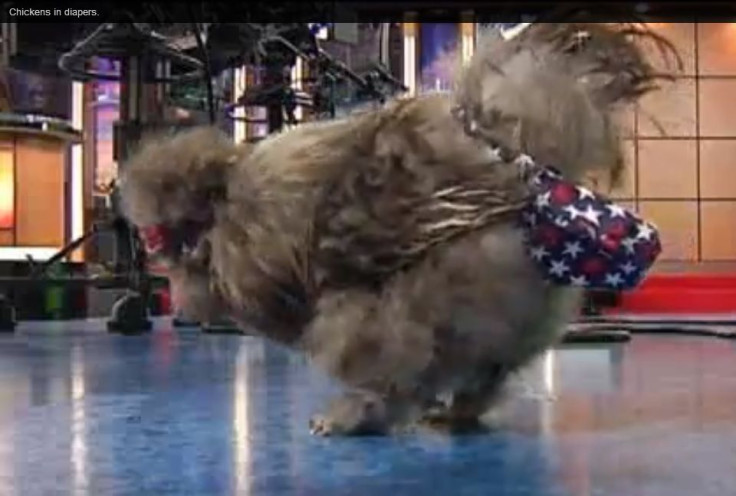Salmonella Outbreak Reaches 307 Cases In 37 States: Are Chicken Diapers The Solution? [VIDEO]

A nationwide salmonella outbreak sickening 307 people, the majority of whom are children ages 10 or younger, has been linked to live baby poultry from multiple feed stores and mail-order hatcheries.
Infections from the bacteria salmonella typhimurium were traced back to chicks and ducklings, often ordered as gifts and backyard pets. The 37 affected states range from coast to coast, with the most cases reported in Colorado, Texas, Washington, and New York.
It is unknown whether this outbreak is related to another outbreak in July that sickened 125 people in 26 states. The July outbreak also originated from live poultry from an Ohio hatchery.
Salmonella Infection: Symptoms To Watch For And How To Prevent Them
Salmonella infections are characterized by diarrhea, fever, abdominal cramps, and vomiting . The symptoms usually begin 12-72 hours after exposure and, at best, resolve in 4-7 days without treatment. At worst, people suffering from salmonella may require hospitalization to treat severe dehydration. The condition could lead to death.
According to the U.S. Centers for Disease Control and Prevention (CDC), there have been 45 salmonella outbreaks linked to live poultry in the U.S., resulting in 1,563 cases of illness, 221 hospitalizations, and 5 deaths.
Those who come into contact with live poultry, no matter the age of the bird, should wash their hands thoroughly with soap and water after touching them or their environment, including cages, feed, and water bowls. People should generally abstain from eating or drinking around ducks and chickens.
Furthermore, the CDC recommends that people with weaker immune systems, especially small children and the elderly, refrain from handling live poultry, as they are more likely to get infected.
Small children are especially prone to infection, as they may come into contact with poultry through field trips and petting zoos. Little kids have less of an ability to resist the temptation to give the fuzzy creatures a kiss. At minimum, adult supervision of children while around poultry is recommended.
Chicken Diapers To The Rescue?
Keeping chickens as backyard pets has recently become a trend, a fact that might be the reason behind the recent rise in Salmonella outbreaks. Rather than be isolated to the coop, chickens as pets are more likely to run in and out of human quarters and be coddled as the beloved family pet.
A reflection of the trend in chicken pets and salmonella, a Denver-based entrepreneur named Mary, who wishes to keep her last name private, is selling a possible solution: chicken diapers. For only $12.50, live poultry lovers can buy chicken-sized diapers to keep chicken-sized poop off their furniture and perhaps their children.
Whether the diapers do anything to prevent salmonella infection has yet to be studied scientifically. It's obvious, however, that they do not minimize human contact with chicken excrement. In fact, they guarantee it as the non-disposable diapers will need washing, and the chickens aren't going to launder them themselves. People who elect to use chicken diapers should wash their hands thoroughly after handling them.
But for those willing to give diapering a try, watch the video below on how to diaper a chicken.



























